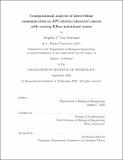Computational analysis of intercellular communication in APC-driven colorectal cancers with varying KRas mutational status
Author(s)
Van Nostrand, Stephen C.(Stephen Christopher)
Download1227506576-MIT.pdf (4.160Mb)
Other Contributors
Massachusetts Institute of Technology. Department of Biological Engineering.
Advisor
Douglas A Lauffenburger.
Terms of use
Metadata
Show full item recordAbstract
Three common KRas mutants were compared with wild type KRas in a mouse model of APC-driven colorectal cancer to understand differences in cell-cell communication. Using single-cell RNA sequencing and a handful of novel computational methods, a set of nine highest priority ligands expressed by non-immune cells that differ statistically between G13D-mutant KRas and the others was identified for further study. This set contains two ligands that have been previously recognized as important in this context, as well as novel ligands and some with poorly understood relevance to the clinic. While no secondary validation of how these ligands could be affecting clinical outcomes was performed here, the simplicity of interpretation of the computational methods demonstrated begs for further study, particularly of the effects of changes in these ligands in vivo. Follow-up studies will be undertaken at the Dana Farber Cancer Institute to continue fleshing out our understanding of how molecular differences in KRas can lead to differences in tumor composition as well as distinct prognoses.
Description
Thesis: S.M., Massachusetts Institute of Technology, Department of Biological Engineering, 2020 Cataloged from student-submitted PDF version of thesis. Includes bibliographical references (pages 71-74).
Date issued
2020Department
Massachusetts Institute of Technology. Department of Biological EngineeringPublisher
Massachusetts Institute of Technology
Keywords
Biological Engineering.